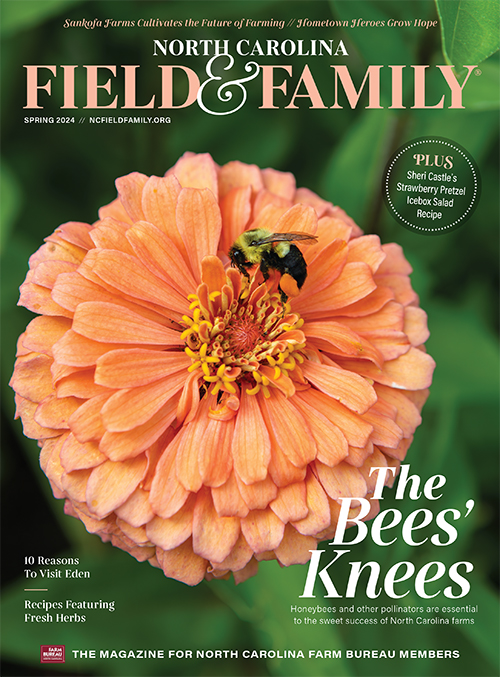North Carolina Pork Farmers Are Committed to Top-Notch Care for Their Animals
While there are many pork producers in North Carolina, no matter how you slice it, farmers are working day and night to care for their pigs.
Kim Hill |
As the world’s third-largest producer of pork products, the U.S. shipped more than 7 billion pounds of pork to foreign markets in 2020, according to the USDA. North Carolina, third in the nation in pork production, is home to the top two hog-producing counties in the country (Duplin first and Sampson second), according to the USDA Census of Agriculture.
While there are many pork producers in North Carolina, no matter how you slice it, farmers are working day and night to care for their pigs. Regardless of their different methods, processes and farm sizes, local hog farmers are bringing safe, efficient and healthy food to your table.
See more: First-Generation Farmers Produce Fresh Pork Products
Pasture-Raised Premium Pork
When Ronald W. Simmons, Jr., decided to try raising hogs, he knew his family didn’t have the resources to farm the way many other farmers do.
“I was always taught to use what you have,” Simmons says.
And what he had was about 30 acres and the 30 years of experience of his father-in-law who had raised pigs outside.
“It was just a hobby at first,” Simmons says of their early days. “It was something for me and dad to do together.”
Simmons soon realized the potential, however, and made critical decisions in 2012 to take their hobby in a new direction by seeking assistance from many sources, including organizations such as A Greener World (AGW). Today, Master Blend Family Farms specializes in the production and distribution of premium, all-natural pork products. Pigs are bred, born and raised to harvest weight on Master Blends’ grassy pastures using sustainable, high-welfare farming practices. Animals are grouped in outdoor pens by age and maturity. Master Blend Family Farms is Certified Animal Welfare Approved by AGW.

Going Whole Hog
Through professional relationships with several geneticists, Simmons works to produce animals with desirable traits such as large litters, fast growth rates and efficient feed conversion. Simmons also recently implemented software to manage breeding cycles more efficiently.
“There is no way you can track all the females’ cycles or the male pedigrees in a notebook,” Simmons says. “We tried that when we were small.”
Master Blend Family Farms now harvests about 5,400 pounds of pork each month. Their products are sold at a general store on their farm near Kenansville, to restaurants and retailers throughout North Carolina and beyond, and at a concession stand they bring to private events.
Simmons enjoys hosting FFA and 4-H groups and speaking to classes at North Carolina A&T University, which named him North Carolina Small Farmer of the Year in 2018. He was acknowledged with Duplin County’s Golden Star Award, honoring significant contributions to the county, and he received the Martin Luther King Jr. Entrepreneur of the Year Award. Simmons was also selected for the inaugural class of Kingsford’s Preserve the Pit Fellowship, which provides aspiring barbecue professionals with immersive training and one-on-one mentorship with industry leaders.
See more: Cattle Connections: North Carolina Local Beef
The Master Blend approach to raising hogs on pasture and the Certified Animal Welfare Approval helps them carve a niche in the market. Simmons stays in touch with fans and customers through an active, energetic social media presence.
“This whole ride being associated with agriculture has been one of the greatest opportunities for my family,” says Simmons, who was not raised on a farm. “The idea was far-fetched in the beginning, but now people look at us and say, ‘Dude, you are doing alright,’ and that’s pretty cool.”

Bringing Home the Bacon
Second-generation hog farmer Justin Edwards has a different approach to pork production, raising hogs more traditionally and on a larger scale. He says pork production of this size is impossible without healthy, well-kept animals at the start of the food chain.
Recipients of North Carolina Pork Council’s Emerging Leader Award, Justin and his wife, Erica, raise about 5,000 hogs a year in a finishing operation for Smithfield Foods. He obtains “feeder pigs” weighing about 40 pounds and raises them to maturity weight of approximately 275 pounds. Justin also raises tom turkeys under contract for Butterball and grows corn, soybeans, wheat, cotton and sweet corn. His grains are sold to area processors.
See more: Caring for Pigs Brings the Generations Together at This Family Farm
“In theory, it’s possible that it’s our soybeans coming back to our farm as soybean meal to feed our hogs and turkeys,” Edwards says. “And to make that complete loop, we take the manure from our animals and recycle it on our fields to help grow our crops.”
Justin and Erica, a third-grade teacher, share the story of agriculture with various groups, including Erica’s students, showing the kids what the pigs eat and where they live. The pigs are raised in airy, climate-controlled barns, with computer systems monitoring air temperature and water flow. Animals have plenty to drink but technology prohibits overwatering, so the precious resource isn’t wasted.

“When I get up in the morning, the first thing on my mind is to make sure those animals are healthy,” Edwards says. “Before I lay down at night, I want to make sure they’ve got a full belly, plenty of water and they’re warm and comfortable.”
As he monitors feed and water intake each day, Justin is also observing the herd for signs of illness.
“We don’t administer blanket antibiotics,” Edwards explains. “But when animals are sick, we give antibiotics to save their lives. I treat those animals just like they were my kids.”
See more: 6 Farm Facts About Pork
In fact, the pork and poultry harvested from his farm are the same proteins the Edwards and their two young children eat.
The recipients of the American Farm Bureau’s Young Farmers and Ranchers Achievement Award in 2019, the Edwards family enjoys opportunities to help educate consumers, starting with young children, about who is growing their food and how it ends up on their dinner table.
“Modern agriculture’s integration over the past 50 years or so has left those of us still doing this to grow more food,” Edwards says. “We can do it because we have become really efficient at what we do.”
– Kim Hill



… [Trackback]
[…] Read More on to that Topic: ncfieldfamily.org/farm/pork-farmers-are-committed-to-their-animals/ […]